We’ve all been there. As soon as one inadvertently plants an X-Acto knife in one’s own forearm or bangs one’s head HARD on a cupboard, one is apt to muse that “medical attention would not be entirely unwelcome at this juncture.” Science fiction characters are no different. No surprise, then, that science fiction and fantasy often feature doctors, nurses, and other healers.
Consider these five SFF works about healing.
Hospital Station by James White (1962)
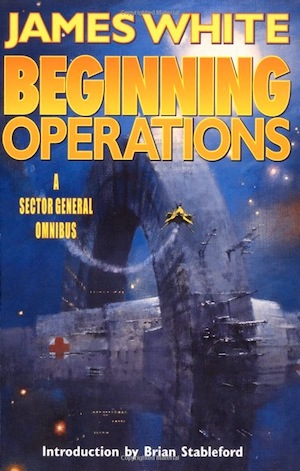
Sector 12 General Hospital is supported by hundreds of civilized worlds. The deep space hospital caters to every known intelligent species, regardless of shape, composition, biochemistry, or radioactivity. Indeed, Sector General is prepared to heal even unknown species.
Hospital Station is a collection of stories/case histories from the early years of Sector General’s existence. Staff are still working out how best to tackle the Herculean task with which they have been entrusted. Administration is still determining to which roles staff is best suited. The stakes are high; mistakes will cost lives.
I am surprised (but only a little) that given the popularity of medical shows, Sector General (and Murray Leinster’s Med Ship series) did not spawn a whole subgenre of medical SF on the scale of MilSF. Or perhaps it is just that nobody has set out to promote such a subgenre… yet.
Healer by F. Paul Wilson (1976)
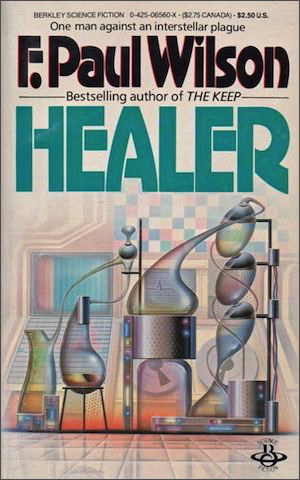
Eluding raiders on a backwater splinter world, Steven Dalt ducks into a cave. He is immediately set upon by an alaret, a cave-dwelling creature for which this planet is notorious. Dalt’s prospects look grim: “of every thousand struck down (by alarets), nine hundred and ninety-nine will die.”
One in a thousand humans can form a symbiotic relationship with the alaret. Dalt is one such. Together, Dalt and his new companion Pard have become a quasi-immortal being. Together, they have remarkable powers of telepathy. These powers will be invaluable and irreplaceable in the treatment of the victims of the mysterious and common condition known as “horrors”… provided Dalt can resist the ennui that comes with endless life.
It’s probably for the best that Dalt never reveals that alarets have a tenth of a percent chance of turning a human into an immortal. If he had, the animals would have been driven extinct by desperate sick and elderly people.
The Healer’s War by Elizabeth Ann Scarborough (1988)
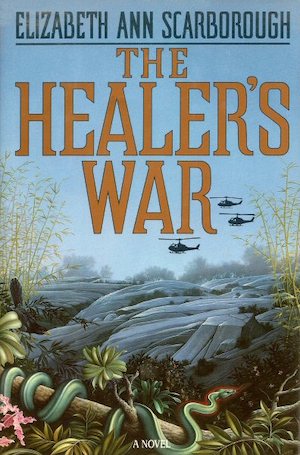
Vietnam War-era military nurse Lt. Kitty McCulley manages to convince Vietnamese holy man Cao Van Xe to temporarily entrust her with his precious medallion while he undergoes surgery. As she is a sensible, modern woman, it would not occur to Kitty that the artifact might be magical, nor that it could imbue her with healing powers beyond mortal ken. But it does.
Healing powers are as much a burden as gift. Kitty cannot be sure she has not cracked under wartime stress. If she is still sane, she is not sure how best to use her new abilities. Even should she gain full command of such abilities, they may not be enough to deal with her latest, most serious challenge: a racist officer determined to rid the wards of all of Kitty’s Vietnamese patients.
Eldrie the Healer by Claudia J. Edwards (1989)
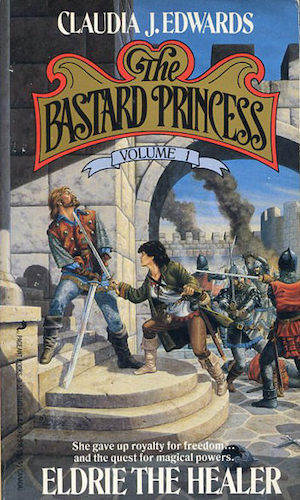
Life as a royal bastard is unrewarding. Eldrie leaves her native Maritiene, hoping to find a new life as a healer in some distant land. The war-torn Republic seemed like a good option—there is nothing like a civil war to produce patients in dire need of medical attention.
The small flaw in this otherwise perfect plan was that to heal members of one faction is to be seen as an enemy of the other. Healing everyone leads to both sides seeing her as an enemy. When offered an alliance of mutual protection by barbarian Huard, Eldrie accepts…only to discover she should have enquired more closely about Huard’s true motivations.
This book was intended to be part of an ongoing series. As far as I know, this was the only volume. I note that publisher Pageant Books vanished after 1989, which could well be the reason subsequent volumes did not appear. Readers should be aware some plot threads are not resolved.
The Bruising of Qilwa by Naseem Jamnia (2022)
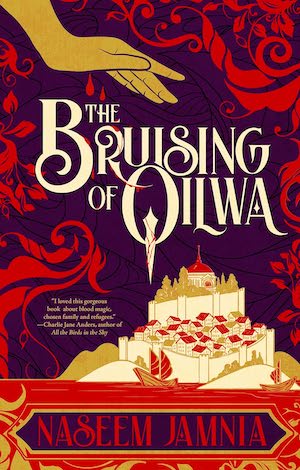
Having fled Dilmun for the comparative safety of the Free Democratic City-State of Qilwa, Firuz has difficulty finding a clinic job; they don’t have the credentials required. Finally they find employment at Kofi’s clinic. Firuz prudently informs their new boss only that they do structuralist magic. Best not to reveal their skill with blood magic.
Caution proves prudent. Blood magicians are being abducted, to what fate none can say. Blood magicians are a popular scapegoat for many ills and the authorities are not inclined to investigate closely. This is a foolish decision on their part, as blood magicians are uniquely qualified to deal with the latest plague sweeping the city. Firuz could cure the victims… but might pay a heavy price if they reveal that they’re a blood magician.
Modern readers may find it difficult to believe that a democratic state (well, nominally so) could be so inept at dealing with a medical crisis like the bruising plague. What is the point of having a state if it cannot deal with national-level crisis?
While MedSF is probably not common enough to warrant subgenre status, there are enough eligible works that I had to leave many off this list of five. Perhaps I missed one or more of your favorites. If so, feel free to mention them in comments.










